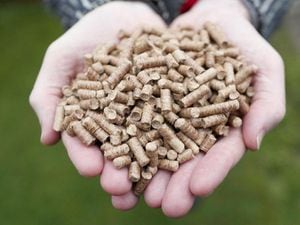N Ireland farmers going back to burning fossil fuels after RHI scandal, MPs told
Farm owners and other businesses who signed up to the botched scheme gave evidence to a Westminster committee.

Farmers in Northern Ireland are reverting back to burning fossil fuels having lost trust in renewable energy following the RHI scandal, MPs have been told.
Farm owners and other businesses who signed up to the botched scheme were scathing in their criticism as they gave evidence to a Westminster committee.
The Northern Ireland Affairs Committee, sitting at Parliament Buildings in Belfast, was hearing from a range of boiler owners impacted by the latest Government bid to rein in the RHI overspend bill.
Chris Osborne, a senior policy officer at the Ulster Farmers’ Union, said of the 300 UFU members who had purchased RHI boilers, more than half were actively exploring a switch back to fossil fuel heat sources.
He said that number was set to rise as the financial hardships brought about by the new reduced tariff rates kicked in.
“I am inundated with phone calls from very concerned boiler owners and every one that rings me is saying they cannot afford to basically maintain the renewable heating system they have and they are having to revert to fossil fuels,” Mr Osborne told committee members.
“There is definitely an urge to revert back to fossil fuel use.”
In the absence of powersharing at Stormont, Northern Ireland Secretary Karen Bradley is taking legislation through Westminster to significantly reduce the subsidies paid to RHI boiler owners.
Average payments are set to decrease from £13,000 a year to £2,000.
The committee is holding an inquiry into the proposed reductions.
Mr Osborne told members: “It’s creating a real air of negativity in terms of ever getting involved in any similar schemes going forward.”
The RHI was designed to encourage businesses and farmers to switch to eco-friendly wood pellet boilers by offering a subsidy to buy the sustainable fuel.
But errors in its design meant applicants were paid more than it actually cost them to buy pellets.
A public inquiry into the scheme which triggered the collapse of Stormont in 2017 is due to report in the coming months.
Committee chairman Dr Andrew Murrison said any trend back to fossil fuels would be seen as “regressive” and potentially embarrassing for the Government.
“The optics of reverting back to fossil fuels at such a time when we are laying into China for building coal fire power stations are frankly not very good,” he said.
Thomas Douglas, a UFU board member and broiler chicken producer for Moy Park, said the poultry industry in Northern Ireland was in danger of becoming a “backwater”.
He said local producers would no longer be able to compete with counterparts in the Irish Republic and Great Britain, where higher renewable subsidies were on offer.
“At the time, RHI was available and a number of us availed of that,” he said.
“In hindsight, we should never have bothered and put gas in and just burnt fossil fuels – we would have been far better off.”
He added: “It’s the end of the trust with government when it comes to looking at renewables and offering incentives to put renewables in.
“Because we have now learnt that you don’t trust government when they say, ‘You sign up to this, we’ll guarantee you 20 years’. Who’s going to do it?
“And that’s not the biggest problem. What bank is going to lend money to anybody – whether it be farmers, hoteliers, factories – on the strength of a renewable payment going forward when they have done this backward step with RHI?
“There’s no credibility there.”
Mr Douglas was particularly critical of Stormont’s Department for the Economy – which was involved in the original flawed design of the scheme and subsequent controversial moves to change the terms of long-term tariff payment contracts.
“They honestly do not know what they are doing,” he said. “That is my personal view and it’s a view of a lot of farmers.”
He added: “To be quite honest, with the track record of the Department of the Economy, I wouldn’t put any credence in any word, any figure or anything they come up with.”
The group representing RHI owners – the Renewable Heat Association NI – also gave evidence to the committee.
RHANI member Avril Robson, who uses RHI boilers in her hotel and farm businesses in Co Tyrone, said she thought she was taking a positive step for the environment when she signed up.
“We all bought into the biomass for the renewable side of it, for our carbon footprint, for the future sustainability of our country and of our future and to set up something that is going to be tangible for the next generation,” she said.
Mrs Robson urged the Government to enter into negotiations with boiler owners to find a tariff level that would be acceptable to all sides going forward.
“We bought into a grandfathered scheme, a bona fide scheme, set up by the (Stormont) government – we feel very betrayed, we feel ostracised by the community because we were seen to be pariahs,” she said.
“What would we like – we would like to go back to the original tariff but, if that is not possible, let’s have negotiation to find a happy ground for all the stakeholders to be happy with going forward.”





